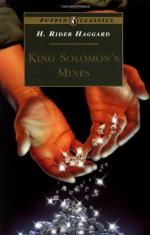As nobody seemed inclined to respond to this heroic version of “Dilly, Dilly, come and be killed,” our late henchman proceeded with his address.
“I am indeed the king, and should ye stand by my side in the battle, if I win the day ye shall go with me to victory and honour. I will give you oxen and wives, and ye shall take place of all the regiments; and if ye fall, I will fall with you.
“And behold, I give you this promise, that when I sit upon the seat of my fathers, bloodshed shall cease in the land. No longer shall ye cry for justice to find slaughter, no longer shall the witch-finder hunt you out so that ye may be slain without a cause. No man shall die save he who offends against the laws. The ‘eating up’ of your kraals shall cease; each one of you shall sleep secure in his own hut and fear naught, and justice shall walk blindfold throughout the land. Have ye chosen, chiefs, captains, soldiers, and people?”
“We have chosen, O king,” came back the answer.
“It is well. Turn your heads and see how Twala’s messengers go forth from the great town, east and west, and north and south, to gather a mighty army to slay me and you, and these my friends and protectors. To-morrow, or perchance the next day, he will come against us with all who are faithful to him. Then I shall see the man who is indeed my man, the man who fears not to die for his cause; and I tell you that he shall not be forgotten in the time of spoil. I have spoken, O chiefs, captains, soldiers, and people. Now go to your huts and make you ready for war.”
There was a pause, till presently one of the chiefs lifted his hand, and out rolled the royal salute, “Koom.” It was a sign that the soldiers accepted Ignosi as their king. Then they marched off in battalions.
Half an hour afterwards we held a council of war, at which all the commanders of regiments were present. It was evident to us that before very long we should be attacked in overwhelming force. Indeed, from our point of vantage on the hill we could see troops mustering, and runners going forth from Loo in every direction, doubtless to summon soldiers to the king’s assistance. We had on our side about twenty thousand men, composed of seven of the best regiments in the country. Twala, so Infadoos and the chiefs calculated, had at least thirty to thirty-five thousand on whom he could rely at present assembled in Loo, and they thought that by midday on the morrow he would be able to gather another five thousand or more to his aid. It was, of course, possible that some of his troops would desert and come over to us, but it was not a contingency which could be reckoned on. Meanwhile, it was clear that active preparations were being made by Twala to subdue us. Already strong bodies of armed men were patrolling round and round the foot of the hill, and there were other signs also of coming assault.
Infadoos and the chiefs, however, were of opinion that no attack would take place that day, which would be devoted to preparation and to the removal of every available means of the moral effect produced upon the minds of the soldiery by the supposed magical darkening of the moon. The onslaught would be on the morrow, they said, and they proved to be right.




